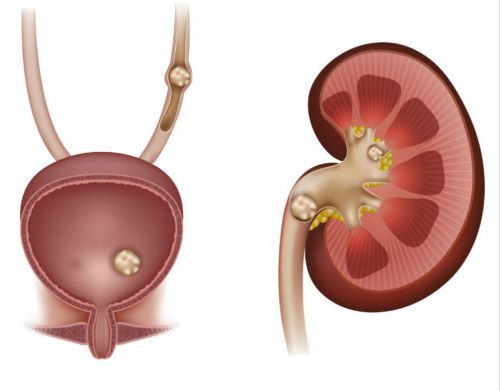During pregnancy any test results that distinguish them from normal values, require careful diagnosis and careful monitoring of the woman and her future baby.
During each medical examination must pass a urine analysis, to determine any violations, and promptly begin the necessary therapy. Specialist shall soon find out why having those or other pathological condition and what is causing them.
Increased protein in the urine during pregnancy is reason enough to survey women at any gestation. Often with this symptom required her hospitalization and further observation only in a specialized Department.
Normal levels of protein and why it appears in the urine
Normal all the liquid in the human body passes through the renal filter, which is located in the glomerular apparatus body. Some elements of blood plasma is able to penetrate through this barrier and get into the urinary sediment. Usually, we are talking about a small number of cells, isolated erythrocytes and proteins of the fine fraction.
Protein in the urine contains a healthy person and pregnant women, due to the increased load on their kidneys (increases the volume passing through them the blood pressure from the growing uterus, etc.).
However, the protein concentration in urine should not exceed maximum permissible values, otherwise this symptom becomes pathological, because its appearance can be connected with the beginning of various diseases.
Considered normal with the following parameters:
- traces of protein in the urinary sediment (the conclusion is usually denoted by the symbol “+/-” or the term “trace”, which means border value);
- the level of protein in a single portion of urine, no more than 10-20 mg/l;
- the level of protein in the daily urine volume not exceeding 0.3 g/l.
In the last stages of pregnancy, when the growing burden on the organs of the urinary tract, the allowable one-time increase in protein to 0.14 g/l, but only subject to satisfactory condition of the woman and the fetus.
As a rule, laboratory parameters of blood and urine tests during pregnancy are similar to those in nonpregnant women, however, may be allowed some variations in different trimesters
If proteinuria is observed once, it is worth repeating the analysis. In the case of repeated increase of the protein component in the urinary sediment, one can speak about the beginning of a pathologic condition.
The degree of proteinuria measured at concentrations in daily urine:
- mild (level does not exceed 1 g/day);
- the average degree (up to 3 g/day);
- severe (loss of protein per day exceeds 3 g).
Proteinuria moderate-to-severe during pregnancy requires compulsory hospitalization of the woman in the hospital, because there is a threat to her health and the baby’s life.
Condition that can lead to proteinuria
Physiological causes
Increase the protein in the urine is not always caused by diseases of the urinary system or other health conditions. Often proteinuria is due to “natural” factors, which are quite easy to fix.
Improper urine collection. If a woman made a fence of the analysis, without prior training, it is, in most cases, is the cause of false positive result (defined in a large number of leukocytes, epithelial cells, bacteria, protein, etc.). To avoid this, you need to wash (front to back) and use as containers sterile container, which you can buy at any pharmacy.

The appearance of protein in urine can be associated with peculiarities of its supply. We are talking about eating high-protein foods for example cottage cheese large fat, milk, eggs, poultry, etc. most Often, this situation occurs in pregnant women who practice fasting “protein” days, and after that go to get tested.
If the body receives a large amount of protein, perhaps its appearance in the urine even absolutely healthy people
Protein in urine during pregnancy appears after the lesson, different kind of physical exertion, as well as on the background of mental surge and exciting situations. In addition, considerable importance in the development of proteinuria plays an inferior sleep and lack of rest during the day.
Excess fluid intake. In such a situation increases the water load on the kidney, with glomerular apparatus does not have time to handle the filtration and reabsorption of all the cellular elements of blood plasma passing through it. Proteinuria is easily reversible and does not cause any danger.
Proteinuria is usually diagnosed after suffering a fever when a woman’s body recovering from an illness. Taking the different groups of drugs may cause the release of protein in the urinary sediment (eg, anti-inflammatory or antibacterial agents).
Pathological causes
A special role in the appearance of proteinuria, especially if pregnant originally recorded by its high performance, is given to the diseases of the urinary organs or preeclampsia of different severity. Each of these conditions has specific symptoms and requires careful diagnosis, since treatment must be immediate and only specific.
Pyelonephritis
The disease is inflammatory in nature, that is, its occurrence is associated with infectious agents that are embedded in the parenchyma of one or both kidneys.
In medicine there is such term as “gestational pyelonephritis”. This condition is observed during pregnancy. It can occur for the first time, or the woman happens aggravation of chronic process.

As a rule, the clinical picture of the disease is quite bright:
- appear aching or dragging pain in the lumbar region on one or both sides, which are of a continuing nature;
- breaks down the process of urination, it is frequent and brings discomfort or pain;
- increased body temperature, appear all the symptoms of intoxication (fatigue, body aches, etc.);
- changing the color of the urinary sediment (it becomes turbid to the naked eye, visible flocculent inclusion, etc.).
There are times when gestational pyelonephritis atypical, and the clinical picture of the disease are only symptoms asthenic character without the temperature of the reaction
Cystitis
Often in pregnancy is the inflammation of the mucous membrane of the bladder. Contribute to congestion in the organs of the urinary tract due to their compression of the enlarged uterus.
The disease is characterized by the following symptoms:
- very frequent and painful urination scanty portions as between trips to the toilet, the urine does not have time to accumulate in the bladder;
- appear aching pain in the lower abdomen, which intensified during the act of urination;
- when pronounced activity of the process can increase the body temperature (usually not above subfebrile values);
- changing the color of the urine, it becomes turbid, sometimes with visible traces of pus or blood.
Preeclampsia
This process is severe pathology, which most often develops on the background of comorbidities in women who are at risk (for example, the presence of diabetes or hypertension in anamnesis).

For the disease characterized by a triad of clinical manifestations:
- edematous syndrome of different severity;
- arterial hypertension;
- proteinuria.
Remember, as soon as women began to appear edemas of any localization, you must, as soon as possible, notify your doctor. The same applies to pathologic fluid retention in the body of the pregnant woman, when the weekly weight gain more than 400-500 mg.
Recommendations for normalization of protein levels
If we are talking about proteinuria, unrelated diseases, is the main event for its elimination can be reduced to the normalization of the lifestyle of a pregnant woman. General recommendations the therapeutic and preventive nature of the following.
You must check that the daily diet attended food rich in vitamins and minerals. You need to restrict the use of those products which contain in their composition of pure protein (milk and cottage cheese of high fat content, eggs, etc.), as well as to reduce the level of salt consumed. Recommended eat enough fresh vegetables and fruits.

When the tendency of women to obesity, preference is given to nutrition with a maximum limit of bakery and confectionery products, fried foods, convenience foods and fast food. Food should be consumed often and fractional (small portions 4-5 times a day).
In a special risk group for the occurrence of proteinuria includes women with overweight or obesity of different degree
We can not allow situations where excessive loss of fluid from the pregnant woman’s body (for example, a long time to be in a hot room or under direct sunlight).
All medications should be taken only with the permission of the physician and according to the strict necessary. If, at the time of treatment in the urinary sediment revealed different degrees of proteinuria, the question of complete abolition of the drug or replacing it with a different tool with a similar mechanism of action.
In order to relieve the kidneys, it is recommended to take the knee-elbow position several times a day (for 10-15 minutes at least 5-6 times). Through this position reduces the pressure on the organs of the urinary system from the growing uterus, especially in the last stages of pregnancy. Improve circulatory processes, filtration and diuresis.
During pregnancy found its use of traditional medicines due to their efficiency and practically full absence of side effects. Use different herbs to prepare teas and infusions.
If proteinuria is negligible, then the purpose of the staminate orthosiphon (kidney tea) will improve the filtration process will have a mild anti-inflammatory and diuretic effects. Infusion is based on it is prepared easily and does not require a woman’s special skills. You need to take the filter pack that contains this herb, pour 100-1500 ml of boiling water and leave to infuse for 20 minutes. After which in infusion add 100 ml of water and drink 2-3 times a day ½ Cup (20-30 minutes before main meal).

You can also prepare a decoction of the leaves and berries of cranberries, rose hips, herb St. John’s wort, cranberry, etc.
To prevent various inflammatory processes in the organs of the urinary tract and improve urine output, recommended pregnant several times a week to make cranberry-cranberry juice or compote
If a woman during pregnancy, blood pressure begins to rise periodically, you need to start a diary of self-control. It is necessary to record the blood pressure numbers in the morning and evening, and all the causes that could influence (for example, the patient washed the floor, up the stairs, etc.).
When it comes to proteinuria, the occurrence of which is associated with different diseases, drug treatment is carried out only in a hospital or maternity home (especially in the last trimester).
The choice of treatment depends on the cause, which led to the increase in the level of protein in the urine (antibacterial, diuretic, hypotensive, etc.).
Proteinuria, or elevated protein in the urine, a phenomenon that requires special attention, despite the satisfactory condition of the pregnant woman, and her lack of any complaints.
Every woman in this period should be aware of the need for continuous examination of the urine and regular supervision by a doctor. When any deviations in your state as soon as possible to ask him for qualified help.




Classic!